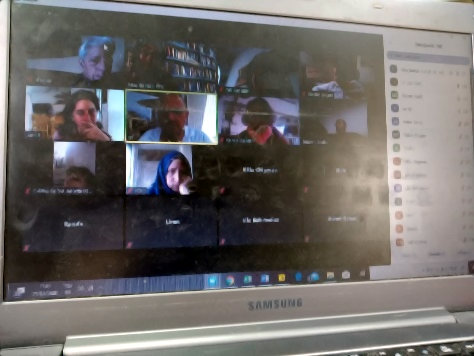Environmental Justice course online meeting, March 27
The change agents course for environmentalists (a course to promote environmental justice, based at the School for Peace in Neve Shalom – Wahat al-Salam)
Summary of a dialogue session in the Coronavirus era
Coordinators/facilitators: Noa Barkai-Reid and Mazen Zoabi
On Friday, March 27, 2020, participants in the SFP Environmental Justice change agents course conducted an exciting and different kind of meeting.
According to the original schedule, an interesting tour of southern Israel was supposed to take place, in order to get acquainted with the region and the dilemmas of the Arab-Jewish conflict from a different perspective. But this tour was postponed due to the reality of the Coronavirus pandemic. This created a new challenge to conduct a meeting of another kind. Since everyone is currently isolated and confined to their homes, we decided to take the opportunity to meet in virtual space.
The meeting began with an engaging lecture by Prof. Danny Rabinowitz on “A Century of Energy: the Generation of Electricity between Two National Movements” and continued with a fascinating discussion of how these issues are relevant to the current crisis.
A dozen participants took part in the virtual meeting. It was exciting and heartening to meet, hear and experience a little our complex contemporary realities from different perspectives of age, nationality, gender, social status and more. The impression emerged that the Coronavirus crisis is slightly blurring the conflicts and forcing people to cope with an existential survival reality without distinctions of identity or nationality; that it is permitting connections and solidarity from a more neutral place without power struggles and politics.
We talked about the space for taking new initiatives in the contemporary reality and the dilemmas that will follow the current crisis. We considered how we would like to see and shape the day that follows. Some of the participants shared the initiatives they are promoting in their circles.
In summary, it was important and very encouraging to meet. Even in a seemingly distant and alienating way, precisely in the days of isolation and disconnection, the images on the screen of the Zoom website enabled a sense of closeness, longing and curiosity to hear and be heard.
We hope that by our next meeting in April, reality will gradually be returning to normalcy and sanity.
Even if not, we will continue to find solutions suitable to the situation.
Article and summary:
Noa Barkai-Reid

